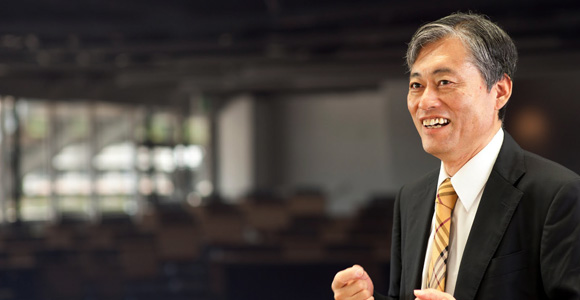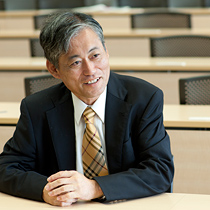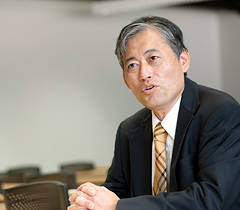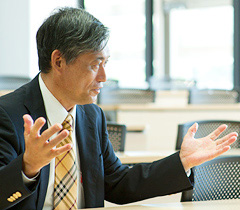Masaru Nakano

Professor Masaru Nakano
Former principal researcher at Toyota Central R&D Laboratories.
Area of expertise: Business engineering, Sustainable manufacturing, Smart city and urban mobility system, Global and green supply chain
Majored in operations research at university
My research specialty is systems engineering, and I majored in operations research (school of management) at university. In this discipline, we try to support strategies and tactics by identifying bottlenecks in processes and using applied mathematics to find solutions; for example, the mathematical optimization of system performance or queuing theory for supply chains.
SDM provides a multicultural environment for the training of global leaders
Seeking overall optimization by studying the entire supply chain, not just the production system
 After joining a Toyota Group company, I was assigned to research what we call "verification," the optimization of the production system using simulation models. Optimization requires going beyond locally optimizing a production system; you must optimize portions that interrelate with other facets of the system. That meant researching the entire supply chain behind the production process, not just the production system but also product development, design and logistics. We quickly found that total optimization could not be achieved by looking at production processes alone. We had to consider production systems and designs that would induce purchasing behavior by consumers--in other words, the scope of research expanded to marketing, sales planning, branding and CSR. During that time I was involved in a number of collaborative international research projects with organizations in Europe and North America in which we looked at programs that would allow Japanese monozukuri (art of manufacturing) principles to survive and flourish in global society and strategies for taking advantage of the unique strengths of Japan.
After joining a Toyota Group company, I was assigned to research what we call "verification," the optimization of the production system using simulation models. Optimization requires going beyond locally optimizing a production system; you must optimize portions that interrelate with other facets of the system. That meant researching the entire supply chain behind the production process, not just the production system but also product development, design and logistics. We quickly found that total optimization could not be achieved by looking at production processes alone. We had to consider production systems and designs that would induce purchasing behavior by consumers--in other words, the scope of research expanded to marketing, sales planning, branding and CSR. During that time I was involved in a number of collaborative international research projects with organizations in Europe and North America in which we looked at programs that would allow Japanese monozukuri (art of manufacturing) principles to survive and flourish in global society and strategies for taking advantage of the unique strengths of Japan.
Research expands from a single company to general social issues
To develop a long-term vision, you must determine the kinds of products and services you wish to bring to market based on long-term forecasts of demand and the assumption that the company will continue to exist. When starting this, you quickly realize the need to consider society as a whole. For us, drafting business and technology strategies for our company meant researching topics such as the environment, energy, and resources as well as social infrastructure such as urban structures and transportation systems. The scope of our studies expanded systematically.
Teaching corporate experience in class
 I draw on my corporate experience when teaching system management technology, system environment theory, and international standardization theory. In system management technology, I take a broad-based approach to the management of everything from product development to distribution. In system environment theory, we examine the environments that surround systems; in other words, everything from consumer behavior and marketing to energy, resources, global environment, falling birthrates, aging demographics, and urban structures. In international standardization theory, I teach standardization mechanisms and frameworks. Japan tends to be strong in components and weak in systems. In other countries, systems are standardized, which allows the participation of small and medium-sized enterprises so that large companies can bring in suppliers to spark business innovation.
I draw on my corporate experience when teaching system management technology, system environment theory, and international standardization theory. In system management technology, I take a broad-based approach to the management of everything from product development to distribution. In system environment theory, we examine the environments that surround systems; in other words, everything from consumer behavior and marketing to energy, resources, global environment, falling birthrates, aging demographics, and urban structures. In international standardization theory, I teach standardization mechanisms and frameworks. Japan tends to be strong in components and weak in systems. In other countries, systems are standardized, which allows the participation of small and medium-sized enterprises so that large companies can bring in suppliers to spark business innovation.
Research at SDM
I have several students in my laboratory, each from a different background and with different interests. Broadly speaking, there are business people, new graduates and exchange students, and each of these groups has its own perspective. The students from the business world emphasize my experiences at Toyota and focus on marketing and business process engineering. The newly graduated students still do not really understand companies, so their interests lean toward environment, resources, energy and other social questions. Exchange students tend to be interested in Japanese monozukuri, which has international brand power, or in Toyota production systems. If they are looking to be active on a global stage, they want to learn about global supply chains that allow multiple companies to function seamlessly.
For all of my students, I emphasize the mastery of skills that will serve them well in real-world careers in the future.
Using SDM's international partnerships to provide multicultural experiences
 I serve as the leader at SDM for the "Global 30" Project for establishing core universities for internationalization administered by the Ministry of Education, Culture, Sports, Science and Technology. In terms of educational content, I do not think there is much reason to study abroad if it means missing out on the very high-level classes offered by SDM, but I do think it is extremely valuable to gain multicultural experiences that are not possible in Japan; to interact with a variety of people and exchange ideas and to have the experience of discussing and debating in another language. Overseas, universities are multicultural environments, something that particularly impressed me when I visited a colleague at Hong Kong University of Science & Technology. I had discussions with students in the PhD and masters programs, two of whom were French and two Italian. All of the Chinese students had study-abroad experiences as well. In Hong Kong, everyone spoke English, and there was a high degree of motivation in the debate. My impression was that it would be very difficult for Japanese to compete alongside these people.
I serve as the leader at SDM for the "Global 30" Project for establishing core universities for internationalization administered by the Ministry of Education, Culture, Sports, Science and Technology. In terms of educational content, I do not think there is much reason to study abroad if it means missing out on the very high-level classes offered by SDM, but I do think it is extremely valuable to gain multicultural experiences that are not possible in Japan; to interact with a variety of people and exchange ideas and to have the experience of discussing and debating in another language. Overseas, universities are multicultural environments, something that particularly impressed me when I visited a colleague at Hong Kong University of Science & Technology. I had discussions with students in the PhD and masters programs, two of whom were French and two Italian. All of the Chinese students had study-abroad experiences as well. In Hong Kong, everyone spoke English, and there was a high degree of motivation in the debate. My impression was that it would be very difficult for Japanese to compete alongside these people.
That being said, Japanese students are, I think, more capable in some senses. I say "in some senses" because there are many different aspects of education at which Japan excels. At the elementary level, education is extremely well-balanced, so students are able to perform well throughout the curriculum, and they learn how to get things done on schedule. What young people need to understand, I think, is that non-Japanese not only have the ability to communicate in English, they also have the attitude that comes from being raised in a multicultural environment, and this makes them completely different.
The concept behind the establishment of SDM was to educate project managers and systems engineers able to be active on a global stage. I encourage students to take full advantage of the multicultural environment provided by SDM. Not only should they study abroad, they should proactively seek out and interact with good teachers and students in other countries, and find ways to use these experiences to advance their careers. I look forward to seeing them prosper as top managers.

